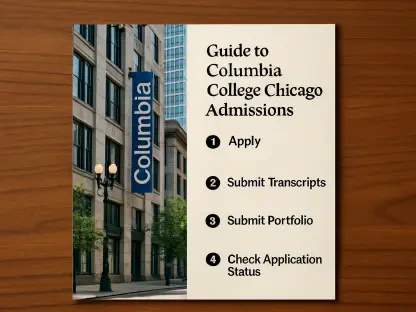In the ever-evolving landscape of higher education, a new federal proposal has ignited fierce debate among institutions across the nation, particularly affecting historically Black colleges and universities (HBCUs). The Trump administration’s higher education compact, which ties federal funding to stringent policy mandates like tuition freezes and admissions restrictions, has placed HBCUs in a particularly precarious position. With financial challenges mounting and institutional missions at stake, how are HBCUs like Saint Augustine’s University in North Carolina responding to this controversial offer? This roundup gathers insights, opinions, and strategic tips from a variety of stakeholders in the higher education sector, aiming to shed light on the nuanced reactions to the compact and its implications for institutional autonomy and cultural identity.
Diverse Reactions Across Higher Education
Saint Augustine’s Cautious Engagement
Saint Augustine’s University stands out as the first HBCU to express interest in the Trump administration’s compact, though its stance is layered with significant reservations. University leaders have highlighted the potential lifeline that federal funding could provide, especially given the institution’s ongoing financial and accreditation struggles. However, they remain wary of mandates that could undermine their mission to serve historically marginalized communities, particularly through restrictions on race-conscious admissions.
This cautious approach reflects a deep-seated tension between survival and identity. Many within the university’s administration are pushing for dialogue with federal officials to ensure that any agreement includes accommodations sensitive to HBCU missions. Their position underscores a broader concern: the need to balance immediate financial relief with the long-term preservation of purpose and values that define institutions like Saint Augustine’s.
Polarized Responses from Other Institutions
Beyond Saint Augustine’s, the higher education sector reveals a stark divide in reactions to the compact. Elite research universities, often with larger endowments, have largely rejected the proposal, prioritizing autonomy over federal incentives. Their stance is rooted in a belief that such mandates threaten academic freedom and institutional independence, setting a precedent for unwanted federal overreach.
In contrast, smaller or ideologically aligned institutions have embraced the compact with less hesitation. Colleges that share the administration’s policy priorities view the funding as a strategic opportunity to advance their goals, even if it means adhering to strict conditions. This split in responses illustrates how financial stability, ideological alignment, and institutional capacity shape decision-making in the face of federal policy proposals.
Expert Commentary on Policy Implications
Policy analysts and higher education advocates have weighed in on the broader implications of the compact, often criticizing its one-size-fits-all framework. Many argue that the proposal fails to account for the diverse missions of institutions, particularly those like HBCUs with specific historical mandates under federal law. They caution that uniform policies risk eroding the unique roles these colleges play in fostering equity and access.
Others in the academic policy sphere suggest that the compact could reshape federal-institutional dynamics for years to come. There is concern that accepting such terms might embolden further federal control over higher education, potentially stifling innovation and diversity. These perspectives highlight a critical need for tailored approaches that respect the varied landscapes of American colleges and universities.
Key Concerns for HBCUs
Financial Strain Versus Mission Integrity
A recurring theme among HBCU stakeholders is the acute financial pressure that makes federal funding tempting, despite the strings attached. For institutions with limited endowments, a tuition freeze mandate could exacerbate existing budgetary constraints, limiting their ability to invest in student services or infrastructure. This practical challenge weighs heavily on decision-makers contemplating the compact.
Beyond finances, there is a profound worry about mission drift. Policies that restrict race-based considerations in admissions or impose rigid ideological audits could fundamentally alter the cultural fabric of HBCUs. Community leaders associated with these institutions emphasize that their core purpose—rooted in addressing systemic inequities—must not be compromised by short-term financial gains.
Cultural and Operational Impacts
Another layer of concern focuses on the cultural implications of the compact’s stipulations, such as narrow definitions of gender and sex or caps on international enrollment. For HBCUs with strong ties to global communities, particularly within the African diaspora, enrollment restrictions could sever vital partnerships and diminish campus diversity. This operational hurdle adds to the complexity of aligning with federal mandates.
On the cultural front, there is apprehension about how mandatory viewpoint audits might reshape campus environments. Such policies could clash with the inclusive ethos many HBCUs foster, potentially alienating students and staff. Voices from within these communities stress the importance of maintaining spaces where open dialogue and diverse perspectives can thrive without federal oversight.
Strategic Tips for Navigating Federal Proposals
Advocating for Mission-Sensitive Policies
One piece of advice echoed by higher education consultants is the importance of HBCUs advocating for policies that reflect their unique roles. Engaging directly with federal agencies to negotiate terms that honor historical mandates could help mitigate the risk of mission erosion. Building a unified front among HBCUs to present a collective voice is seen as a powerful strategy in these discussions.
Additionally, forming alliances with other institutions facing similar challenges can amplify their influence. By sharing resources and best practices, HBCUs can strengthen their negotiating position and push for accommodations that safeguard their autonomy. This collaborative approach is viewed as essential in navigating federal proposals without sacrificing core values.
Balancing Short-Term Gains with Long-Term Vision
Another tip from academic strategists centers on weighing immediate benefits against long-term consequences. While federal funding might address urgent needs, HBCU leaders are encouraged to conduct thorough impact assessments to understand how compliance could affect future operations. This forward-thinking mindset is critical to avoiding decisions that might yield temporary relief at the expense of enduring stability.
Transparency with stakeholders—students, faculty, and alumni—is also recommended as a way to maintain trust during such deliberations. Keeping these groups informed about the potential trade-offs ensures that any decision reflects the broader community’s priorities. This inclusive process can help align institutional choices with shared goals and cultural commitments.
Reflecting on the Path Forward
Looking back on the discussions surrounding the Trump administration’s higher education compact, the diverse perspectives gathered in this roundup paint a vivid picture of a sector at a crossroads. The cautious interest from Saint Augustine’s University, juxtaposed with outright rejections and eager acceptances from other institutions, reveals the complex interplay of financial need, ideological alignment, and mission fidelity. For HBCUs, the stakes are particularly high, as they grapple with preserving their historical purpose amid pressing operational challenges.
Moving forward, a key step for HBCU leaders involves developing robust frameworks to evaluate federal proposals, ensuring that decisions prioritize both survival and identity. Exploring alternative funding sources, such as private philanthropy or state partnerships, could reduce reliance on restrictive federal incentives. Additionally, fostering ongoing dialogue with policymakers to advocate for flexible, inclusive policies emerges as a vital consideration, offering a pathway to safeguard the diverse missions of higher education institutions in an era of heightened federal scrutiny.









